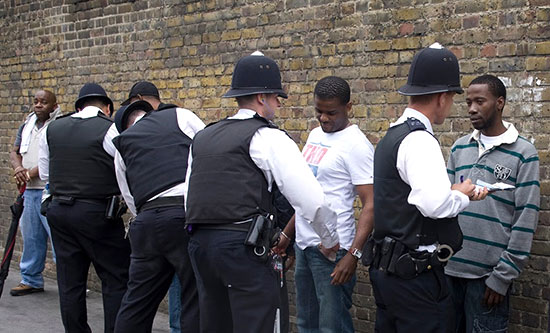
The government’s authoritarian drive continues with Home Secretary Suella Braverman’s instruction to police on 19 June to ‘ramp up’ the use of stop-and-search powers. These powers, which the Home Office’s own figures show are seven times more likely to be used against black people than against white people, enable police to stop and search anyone they have ‘reasonable grounds’ to suspect of carrying a weapon, drugs, stolen property, or anything that could be used to commit a crime. Braverman attempted to justify the disproportionate targeting of young black males with the fact that they are more likely than other groups to be victims of knife crime. In her message to all 43 police forces in England and Wales, she invoked the racist narrative of violent black culture by stating that her aim was ‘to keep the public safe’ from the ‘dangerous culture’ of carrying weapons, adding that she backed the police ‘in tackling this blight in communities which are disproportionately affected, such as among young black males’.
Braverman’s argument for her intervention focused entirely on knives, even though only 9% of stop and searches result in the discovery of weapons, and 65% are recorded as drugs-based. HM Inspectorate of Constabulary and Fire & Rescue Services reports that the stop and search of children suspected of involvement in county lines drugs running disproportionately targets black boys and is not an effective tool against the criminal gangs that exploit them. The Home Office’s own assessment of a 2008-2011 escalation in stop and search, Operation BLUNT 2, with the stated aim of combating knife crime, found ‘no discernable crime-reducing effects from a large surge in stop-and-search activity’. The report also showed that during the operation, ambulance call-outs responding to weapons-related injuries fell the most in boroughs with the smallest increases in stop and search. In other words, the current ratcheting up of stop and search is not intended to reduce violence or tackle the illegal drugs trade, but to intimidate young black people at a time when they and the rest of the working class are feeling the pressure of the cost-of-living crisis, and to sow division in society along racial lines. Labour Shadow Home Secretary Yvette Cooper reinforced the government’s argument, claiming that ‘stop and search is an extremely important tool in the fight against knife crime’.
The wider context of crackdown
While Braverman’s statement might seem to imply a change in direction regarding stop and search, the reality is that in most police force areas (PFAs) use of the powers surged during the lockdowns of 2020-2021, and has remained above pre-Covid levels ever since. In the first three months of the 2020 lockdown, nearly a third of black men aged 18-25 living in London were stopped by the Met. It was the enhanced powers afforded him under Covid regulations that Met police constable Wayne Couzens used to detain Sarah Everard, whom he later raped and murdered. However, while the lockdowns provided an excuse to grant police more powers, figures published by the campaign group StopWatch show that use of stop and search was already rising before the pandemic. 39 out of 43 PFAs showed an increase in the practice between 2018-2019, with 35 remaining above pre-Covid levels in 2022.
The Casey Report, published in March, found the Met to be institutionally misogynistic, racist, and homophobic, describing stop and search as a ‘racialised weapon.’ Despite refusing to accept these findings, Met Commissioner Mark Rowley has the backing of Braverman and London’s Labour mayor, Sadiq Khan.
Alongside the crackdown on individuals’ rights to go about their lives unmolested by the state comes the intensification of legislation to prevent them fighting back. The Police, Crime, Sentencing and Courts Act 2022, as well as restricting the right to protest, increased stop-and-search powers by enabling police to detain, without suspicion, anyone previously convicted of a knife crime, and the Public Order Act 2023 was rushed through with the support of Labour to empower police to deal more harshly with groups such as Republic and Just Stop Oil. The act allows police to search anyone in case they are carrying equipment to use in a disruptive protest, such as for ‘locking on’.
Building on a history of police repression
Prior to the Police and Criminal Evidence Act 1984 (PACE), police used an assortment of antiquated laws to stop and search whomever they liked. These ‘sus’ (suspected person) laws were used by the Met to target the working class, particularly black and Irish young people. In 1981, Operation Swamp used sus laws to detain 1,000 people in 10 days, igniting the Brixton uprising. PACE was implemented as a response, and while it appeased liberals by introducing the requirement for ‘reasonable suspicion’, it effectively entrenched the power of stop and search. Any restrictions on the police were soon watered down with the Criminal Justice and Public Order Act 1994, Section 60 of which enables the suspension of reasonable suspicion in a given area for a defined period of time. Braverman’s call for more stop and search comes couched in the hypocritical language of making the police more ‘accountable’. She has said that forces must notify the local community of the imposition of a Section 60 order ‘unless this would hinder a sensitive operation’, and has urged the prompt publication of data relating to every stop and search, including bodycam footage, to avoid police facing ‘trial by social media’.
Increasing police powers is part of a broader assault against the working class, who in the coming period will be driven to fight back against escalating austerity and oppression. The RCG will continue to stand with black and ethnic minority people and other marginalised groups in opposing stop and search and fighting for the liberation of the whole of the working class.
Felix Lancashire
FIGHT RACISM! FIGHT IMPERIALISM! 295 August/September 2023




